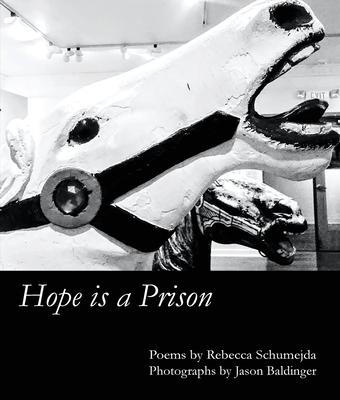"Rebecca Schumejda's Hope is a Prison is a gut-wrenching collection of poems shining an interrogation room light on the intersecting
narratives connecting multiple victims of abuse. The familiar threads of poverty, family denial, shame, and failure of social
safeguards are told in mostly short pieces that have been crafted with sharp detail, delivering the kind of visceral punch that stays with you for days after reading. These poems are best read in sequence like a short story. Stark black and white photographs, by Jason Baldinger further emphasize the cold rooms and environments where the events unfold. Rebecca Schumejda's voice is steeped in the immense humanity and experience of what she writes. With Hope is a Prison, she's created a heavy, vital accounting of intergenerational abuse that has the power to break your heart. It also has the power to redeem. The words of main protagonist, Liberty Zerillo, as she reflects on her journey of survival, "It's the simple acts of kindness that kept me alive," end this story with a glimmer of resonant light. It's the most that any of us can hope for."
-Wendy Raney, Author of Girl on the Highway
"A grim tale with trash fairy overtones, Rebecca Schumejda's new chapbook, "Hope is a Prison," is at once chaotic and reasonable.
The threads of the story may confuse at first, just as in this life. On closer reading, it's a chronicle of how one sin begets another,
how a cloak of formal religion can conceal a bitter truth beneath. There's a confusion of blame, assistance, denial and finally, the horror of epiphany. The main narrator, a young girl named, "Liberty," is at anything but. She is surrounded by others equally damaged, equally hobbled. With lines like, "...stray cat
husband who held my father like a feather between his teeth," this is Schumejda at the height of her considerable powers,
understatement that softly wallops the reader. Jason Baldinger's grainy photos set the scene, with shots of decayed carousels and other signs of abandonment's loss. They reflect unfathomable serenity in the aftermath of the deeds described."
-Cheryl A. Rice, Author of Love's Compass
